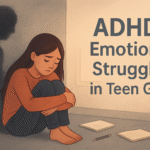Anxiety triggers can be elusive yet profoundly impactful, affecting individuals in various aspects of life. Understanding what sparks anxiety attacks is essential for anyone seeking to improve their mental health and well-being. Research highlights that multiple contributors, including biological factors of anxiety and environmental influences on anxiety, can escalate these distressing episodes. By recognizing these triggers, individuals can develop effective coping strategies for anxiety, turning the tide in favor of better management and recovery. In this blog post, we will explore the diverse range of anxiety triggers and offer practical insights into lifestyle changes for anxiety management.
The catalysts behind anxiety symptoms often encompass a complex interplay of internal and external factors. These stress-inducing elements may arise from one’s genetic predisposition and life circumstances, leading to heightened levels of distress. Through this exploration, we’ll uncover various anxiety-causing agents and discuss their implications on mental wellness. With an emphasis on understanding these triggers, this post aims to equip readers with valuable techniques to confront anxiety and promote healthier coping mechanisms.
Understanding Anxiety Triggers: A Deeper Dive
Anxiety triggers can be categorized into several key areas, each influencing individuals differently based on their unique experiences. Biological factors, such as genetics and neurochemistry, pave the way for heightened sensitivity to stressors. Research indicates that individuals with a family history of anxiety may inherit certain traits that predispose them to experience anxiety more intensely. This biological predisposition can manifest in various ways, such as heightened emotional responses or a reduced capacity to handle stress, thus affecting day-to-day activities and overall functionality.
Moreover, environmental influences also play a crucial role in triggering anxiety attacks. Factors such as major life changes, social dynamics, and experiences of trauma can magnify feelings of anxiety. For instance, a sudden job loss or a divorce can serve as significant stressors that provoke an anxiety response. A study highlighted by the American Psychological Association illustrated that nearly three-quarters of participants identified life transitions as primary triggers for their anxiety, underscoring the need for tailored coping strategies that address these specific challenges.
The Role of Lifestyle Changes in Managing Anxiety
Lifestyle choices significantly impact mental well-being, with habits such as diet, exercise, and sleep directly linked to anxiety levels. Poor nutrition and lack of physical activity contribute not only to physical health but also to emotional resilience. A balanced diet rich in essential nutrients, along with regular exercise, can enhance mood and minimize anxiety symptoms. As noted in the *Journal of Clinical Psychology*, individuals who adopt healthier lifestyle changes often report a decrease in their anxiety levels, highlighting the importance of integrating healthier habits into daily routines.
Sleep is another critical component that intersects with anxiety management. Insufficient or poor-quality sleep can exacerbate feelings of anxiety and irritability, creating a vicious cycle. Establishing a consistent sleep schedule, alongside practices such as relaxing bedtime routines, can significantly improve sleep quality and, in turn, reduce anxiety symptoms. Therefore, recognizing the impact of lifestyle choices and making deliberate modifications can serve as effective coping strategies for those managing anxiety.
Coping Strategies: Practical Techniques for Anxiety Relief
Effective coping strategies are vital for individuals experiencing anxiety, and various techniques exist to help manage symptoms. Cognitive Behavioral Therapy (CBT) has emerged as a front-line treatment, demonstrating significant efficacy in shifting negative thought patterns that can trigger anxiety. Participants in recent studies reported that CBT not only helped them recognize their triggers but also provided tools to reframe and challenge anxious thoughts, cultivating a healthier mental outlook.
Additionally, mindfulness and holistic approaches have gained popularity for their positive effects on anxiety management. Practices such as meditation, yoga, and breathing exercises offer individuals the tools to focus on the present moment and reduce overwhelming feelings of anxiety. A prominent study published in the *Journal of Alternative and Complementary Medicine* confirmed that mindfulness practices led to improved anxiety scores among participants, showcasing the potential of these techniques as supplementary strategies alongside traditional therapeutic options.
Biological Factors of Anxiety: Understanding the Roots
The biological factors influencing anxiety disorders are complex and multifaceted, often intertwining with a range of genetic and neurochemical components. Studies have shown that specific genetic markers may increase the likelihood of developing anxiety disorders, signifying the importance of biological predispositions. Individuals with a familial background of anxiety disorders may find themselves facing similar challenges, highlighting the need for awareness and early intervention to combat potential anxiety symptoms before they escalate.
Additionally, neurochemistry plays a crucial role in anxiety responses. Dysregulation of neurotransmitters, such as serotonin and dopamine, can result in heightened states of anxiety. As researchers continue to explore these biological underpinnings, it becomes clearer that addressing both the genetic and chemical aspects of anxiety is essential for effective treatment options, paving the way for specialized therapeutic interventions aimed at alleviating anxiety symptoms.
Environmental Influences: The Impact of Life Situations
Environmental factors significantly shape the experience of anxiety, often provoking anxiety attacks during times of change or stress. Major life events—such as moving to a new city, experiencing a divorce, or losing a loved one—can act as powerful triggers, situating individuals into a heightened state of anxiety. Understanding these influences can assist individuals in identifying their specific triggers and in developing tailored coping mechanisms that prioritize emotional resilience during challenging times.
Moreover, everyday surroundings and social contexts also contribute to anxiety levels. Factors such as work pressures, societal expectations, and personal relationships can create an atmosphere of persistent stress. A notable survey revealed that social interactions can intensify feelings of inadequacy, particularly in high-pressure environments, necessitating the development of coping strategies that help to buffer against environmental stressors. As such, fostering supportive social networks and exploring effective stress relief techniques become imperative for managing anxiety.
The Impact of Social Media on Anxiety Levels
In today’s technologically driven society, social media has significantly impacted mental health, particularly in relation to anxiety disorders. The constant barrage of curated images and lifestyles can foster feelings of inadequacy, comparison, and heightened anxiety among users. Research from the University of California indicates a direct correlation between social media use and increased anxiety symptoms, particularly in younger populations who may feel pressured to conform to unrealistic standards presented online.
Additionally, the addictive nature of social media can lead to unhealthy patterns of engagement, with individuals often spending excessive amounts of time online. This diminished real-life interaction can exacerbate feelings of isolation and anxiety, reinforcing the need for individuals to adopt healthier boundaries with technology. Encouraging regular breaks from screens and promoting offline engagements can help mitigate the anxiety-provoking effects of social media, ultimately improving overall mental health.
Integrating Therapy and Medication for Comprehensive Care
Effectively managing anxiety often requires a multifaceted approach that combines both therapeutic and pharmacological interventions. Cognitive Behavioral Therapy remains a cornerstone treatment, equipping individuals with critical coping strategies to challenge anxious thoughts and navigate stressors. However, integrating medication into this treatment plan can provide additional relief for those with moderate to severe anxiety symptoms. SSRIs and benzodiazepines may be prescribed as part of a comprehensive care strategy, ensuring that patients have access to the full spectrum of treatment options.
It is essential for individuals to engage in open discussions with healthcare providers regarding their specific needs and potential medication side effects. Collaborative decision-making can lead to personalized treatment strategies that effectively address the complexity of anxiety disorders, integrating lifestyle modifications, therapy, and medication in a cohesive manner. By recognizing the importance of such a holistic approach, individuals can work toward sustainable anxiety management and improved quality of life.
The Importance of Support Networks in Anxiety Management
The role of support networks cannot be overstated when it comes to managing anxiety disorders. Connecting with friends, family, or support groups can provide much-needed encouragement and solidarity for those struggling with anxiety. Sharing experiences, coping strategies, and emotional insights fosters a sense of community, which can alleviate feelings of isolation often associated with anxiety. Research indicates that social support is a significant protective factor against anxiety, enhancing one’s ability to cope with stressors effectively.
Moreover, support networks can serve as a valuable resource for individuals seeking mental health advice and guidance. Engaging with others who have similar experiences can offer practical solutions and reinforce the understanding that they are not alone in their struggles. Ultimately, fostering these connections provides individuals with a sense of belonging and empowerment, essential elements that contribute to their overall emotional well-being and resilience in the face of anxiety.
Mindfulness and Holistic Practices in Anxiety Relief
As mindfulness and holistic practices gain recognition in the mental health landscape, their efficacy in managing anxiety becomes increasingly evident. Mindfulness meditation, yoga, and other relaxation techniques have demonstrated promising results in reducing anxiety symptoms, encouraging individuals to remain present and mitigate overwhelming thoughts. Studies reveal that individuals who engage regularly in mindfulness practices report significant reductions in anxiety levels and improved emotional regulation, emphasizing the importance of integrating these techniques into daily routines.
Holistic approaches often address the interconnectedness of mind, body, and spirit, creating a comprehensive framework for anxiety management. By cultivating self-awareness and self-care practices, individuals can develop resilience against anxiety triggers and promote overall well-being. As more research highlights the benefits of these integrative strategies, individuals are encouraged to explore mindfulness and holistic practices as vital components of their anxiety management toolkit.
Frequently Asked Questions
What are common anxiety triggers that can lead to anxiety attacks?
Common anxiety triggers vary from person to person but often include biological factors of anxiety such as genetics and hormonal imbalances. Environmental influences on anxiety, including major life changes, stress from work or relationships, and exposure to trauma, also play a significant role. Additionally, lifestyle changes for anxiety management—like poor diet, lack of exercise, and sleep disturbances—can exacerbate symptoms. Understanding these anxiety triggers is essential for developing effective coping strategies for anxiety.
| Key Points | Description |
|---|---|
| Anxiety Disorders | Common mental health conditions impacting daily life. |
| Triggers of Anxiety Attacks | Biological factors, environmental influences, mental health disorders, lifestyle choices, social media, and technology. |
| Coping Strategies | Cognitive Behavioral Therapy (CBT), medication, and holistic approaches such as mindfulness. |
| Research Insights | Recent studies highlight genetic predisposition, effects of major life changes, and the impact of lifestyle on anxiety. |
Summary
Anxiety triggers encompass a wide array of factors that can significantly influence an individual’s mental well-being. Understanding these triggers is crucial for those looking to manage anxiety attacks effectively. Biological factors, such as genetics, indicate a predisposition to anxiety, while environmental influences highlight the impact of major life events on mental health. Additionally, lifestyle choices and the pervasive nature of social media can exacerbate anxiety symptoms. By comprehensively recognizing these triggers, individuals can implement tailored coping strategies, ranging from therapy to lifestyle changes, ultimately leading to better mental health and resilience against anxiety.

